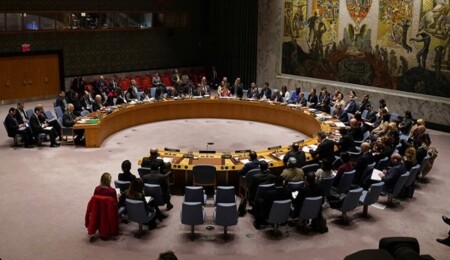UN Security Council to Reaffirm Commitment to Federal Cyprus Solution

The United Nations security council is set to reaffirm its commitment to a federal solution to the Cyprus problem, according to a draft copy of the resolution which will see it extend the mandate of the UN peacekeeping force in Cyprus (Unficyp) until January 31, 2026.

The draft, which was seen by the Cyprus Mail on Friday, stressed the security council’s “full support” for Secretary-General Antonio Guterres’ efforts to find common ground, and “reiterates the importance of openness, flexibility, and compromise in finding common ground with the goal of returning to formal negotiations”.
It added that the security council “urges the sides to renew their efforts to achieve an enduring, comprehensive, and just settlement based on a bicommunal, bizonal federation with political equality”.
To this end, it said it “strongly encourages all parties to seize the opportunity presented by [Guterres’] ongoing engagement, and stresses that the status quo is unsustainable, that the situation on the ground is not static, and that the lack of an agreement furthers political tensions and deepens the estrangement of both communities.”
It then said that this estrangement risks “irreversible changes on the ground” and reduces the prospects of a settlement.
Additionally, it said it urges both sides and all involved parties to “deescalate tensions in and around the buffer zone and to refrain from actions which are not conducive to the broader peace process”, stressing the “importance of respect for the integrity and inviolability of the buffer zone”.
The resolution also made special reference to the “critical importance of full adherence to international law in the handling of asylum seekers and refugees”, with the last six months having seen the Republic of Cyprus and the UN in open conflict over asylum seekers who found themselves in the buffer zone.
In his six-monthly report, submitted earlier this month, Guterres wrote that “a total of 142 asylum seekers, including 35 children as young as nine months old, were stranded in the buffer zone following a decision by the Republic … to deny them access to asylum procedures and force them back into the buffer zone”.
“This emergency situation compelled the mission to provide emergency humanitarian support in coordination with the office of the United Nations high commissioner for refugees (UNHCR),” he said, with the aim of bringing “an end to the pushbacks and to the repeated incursions of the Greek Cypriot immigration police unit into the buffer zone”.
He had added that that the dispute over asylum seekers “impacted the mission’s resources and occupied much of Unficyp’s engagements with the Republic”, adding that “both sides showed disregard for the mission’s authority in the buffer zone as they pursued unabated their unauthorised constructions in and around the buffer zone”.
He later wrote that the six-month reporting period was “marked by the forcible pushbacks of asylum seekers into the buffer zone” by the Republic’s police.
Outside of the matter of asylum seekers, the security council also found that “the socioeconomic disparity between the two Cypriot communities has widened further”, and said it recognises that “this risks leading to further estrangement on the island”.
It thus urged both sides of the island to “step up their efforts to promote intercommunal contacts, intra-island trade, reconciliation, and the active engagement of civil society, in particular women and youth, recognising that regular, effective contact and communication between the two sides enhances the prospects for a settlement”.
It added that such contacts are “in the interests of all Cypriots and help to address island-wide matters, including health, crime, environmental protection, economic issues, issues related to the adverse impacts of climate change, and challenges related to migration”.
On the issue of Varosha, it said it “deeply regrets the ongoing disregard of the call for immediate reversal” of the opening of parts of the abandoned, fenced-off area of Famagusta which was opened to the public unilaterally by then-Turkish Cypriot ‘prime minister’ and current Turkish Cypriot leader Ersin Tatar in October 2020
It added that it “cautions against any further actions in relation to Varosha” which are not in accordance with security council resolutions.
Guterres had written that “no steps were taken to address the call made by the UN Security Council … for the immediate reversal of the actions taken since October 2020” by the north to open the area up for tourism.
He added that Unficyp “did not observe any significant change” in the area which is currently open to visitors, but that “the mission has limited access to that area”.
The security council also called for the “reinvigoration” of the bicommunal technical committee on education, which has suffered from the Turkish Cypriot withdrawal from the “Imagine” programme since 2022.
It went on to say it “deeply regrets the lack of progress on an effective mechanism for direct military contacts between the sides and the relevant involved parties”, and thus urged “flexibility and engagement … facilitated by Unficyp, to develop a suitably acceptable proposal on the establishment of such a mechanism”.
It also expressed its appreciation for both the countries which contribute personnel to Unficyp and to both the governments of the Republic of Cyprus and Greece, which voluntarily financially contribute to Unficyp’s operation.
Source: Cyprus Mail


Comments
Attention!
Sending all kinds of financial, legal, criminal, administrative responsibility content arising from illegal, threatening, disturbing, insulting and abusive, humiliating, humiliating, vulgar, obscene, immoral, damaging personal rights or similar content. It belongs to the Member / Members.